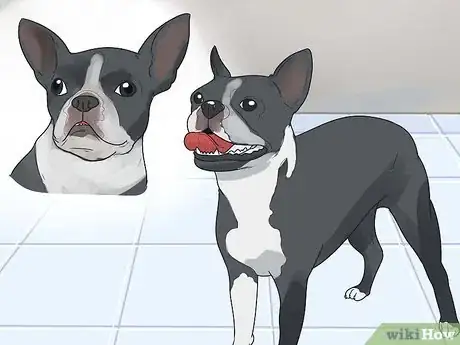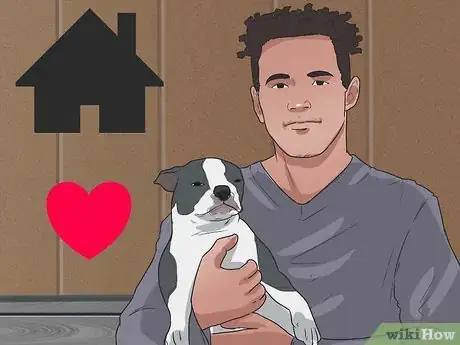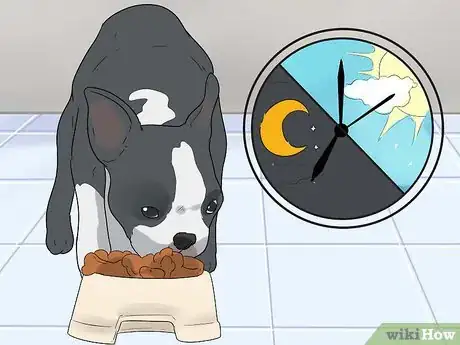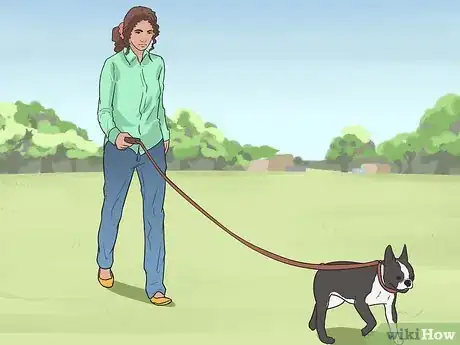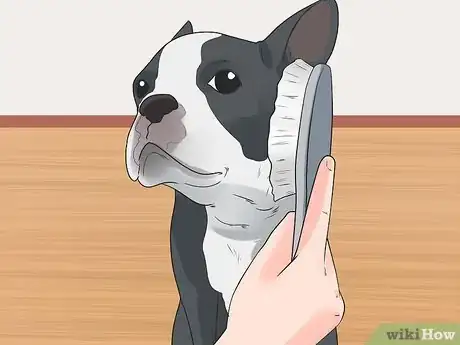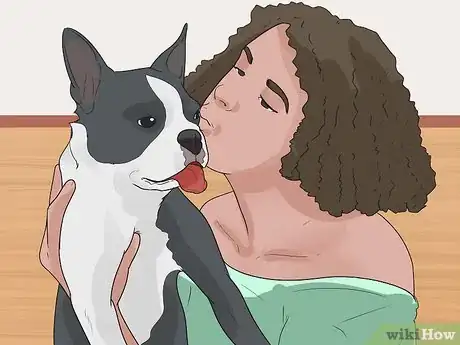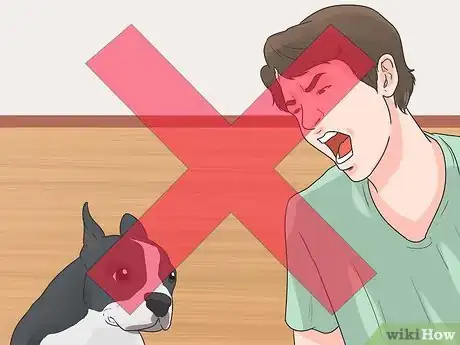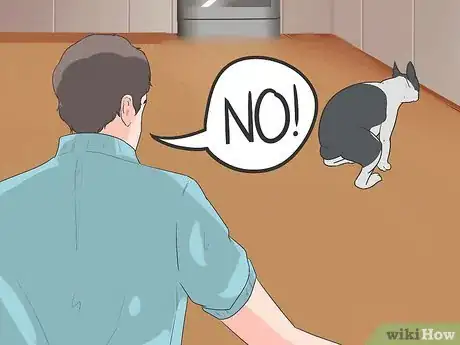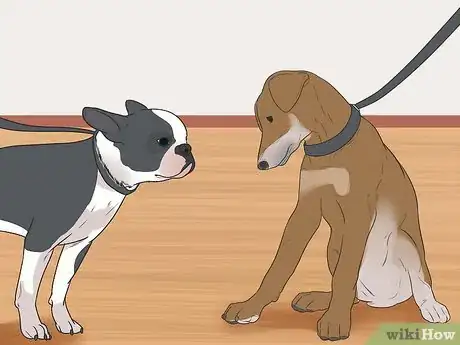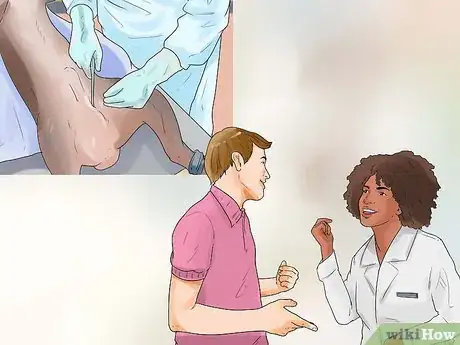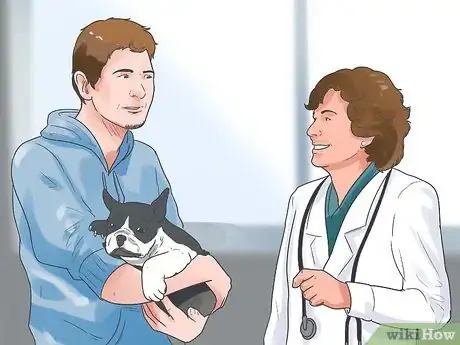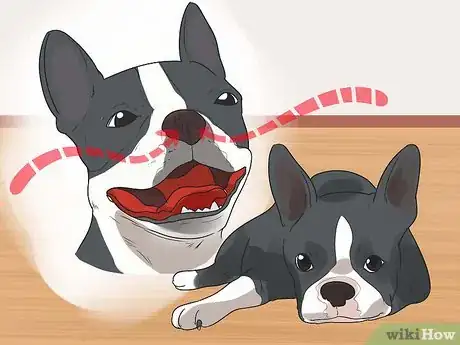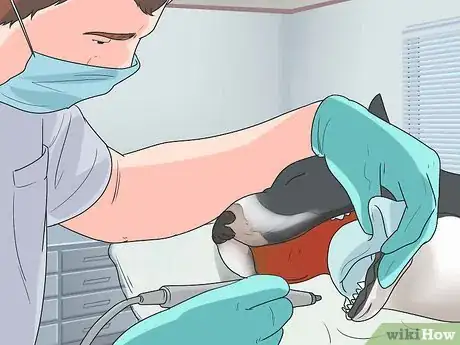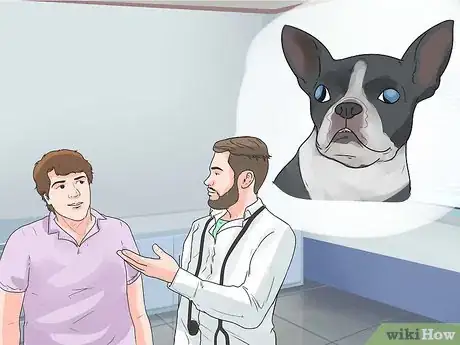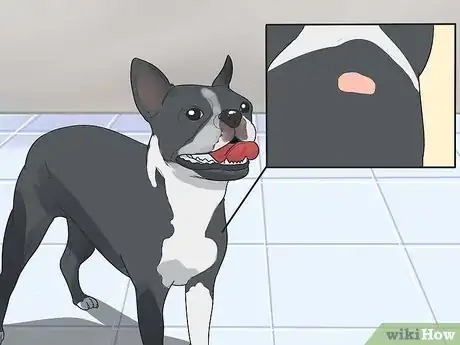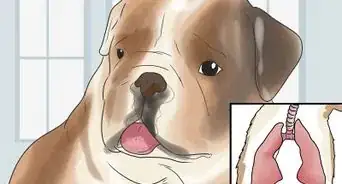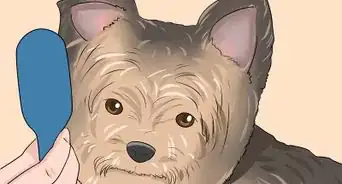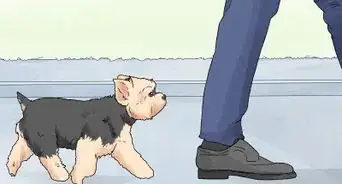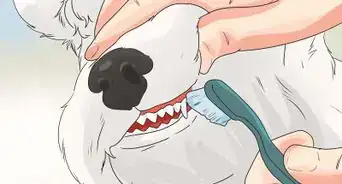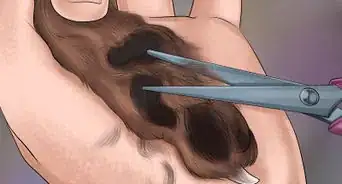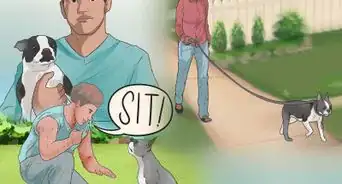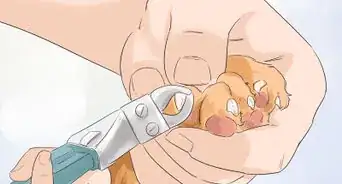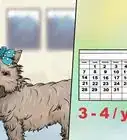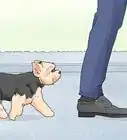This article was co-authored by Belgin Altundag. Belgin Altundag is a Certified Dog Trainer and the Owner of Happy Doggies Day Care/Day Camp in West Hollywood, California. A passionate animal lover, Belgin is knowledgeable about multiple training styles, including obedience training, problem-solving, activity training, and behavior modification. In addition to being an Animal Behavior College’s Certified Dog Trainer (ABCDT), Belgin has also completed the Training Cesar's Way Fundamentals of Dog Behavior and Training Programs 1 and 2 and is certified by the American Red Cross in Cat and Dog First-Aid.
There are 8 references cited in this article, which can be found at the bottom of the page.
wikiHow marks an article as reader-approved once it receives enough positive feedback. In this case, 100% of readers who voted found the article helpful, earning it our reader-approved status.
This article has been viewed 63,401 times.
An original American breed, the Boston Terrier is a bright, friendly dog that's generally a joy to care for. However, like all dogs, caring for a Boston Terrier comes with some challenges. In addition, due to their unique breeding, owners need to be aware of the health issues that can be a concern for this breed. Understanding these factors is important to raising a happy, healthy Boston Terrier.
Steps
Knowing What to Expect
-
1Know the unique joys of this breed. When it comes to dogs, every breed has its pros and cons, and Boston Terriers are no different. In general, Boston Terriers are known to have some of the following positive traits which can make them fun and easy to care for:[1]
- Friendly, good-natured temperament. Good with kids and other pets.
- Not many grooming needs
- Playful and lively, but not hyperactive.
- Small but resilient.
-
2Know the unique difficulties of this breed. While Boston Terriers make great companions for the reasons above, they aren't without their shortcomings.[2] The "cons" below can make them a little more difficult to care for than other breeds:[3]
- Can have behavior problems if not trained well.
- Sometimes tricky to housetrain.
- Can drool frequently or suffer from bad gas (seriously).
- Can tend to make lots of noise (not just barks, but also wheezing, snorting, huffing, sniffling, and snoring).
- Can be vulnerable to certain health problems (see section below).
Advertisement -
3Be aware of this breed's special needs. Boston Terriers need:[4]
- A place to live where they can spend much of their time indoors (they do not tolerate heat or cold well).
- A place to live where they won't be constantly left alone (they suffer from separation anxiety easily)
- A trainer who's willing to be patient, gentle, and light on punishment (Bostons can be a sensitive breed).
- Frequent checkups with a vet.
- An owner who's willing to take special efforts at home to protect the dog from likely health issues.
Your Dog's Routine
-
1Feed your dog twice a day. With their small builds and moderate energy levels, Boston Terriers don't require lots of food. Give your dog 1/2 cup to 1 1/2 cups of high-quality dry food once in the morning and once in the evening. A selection of well-reviewed dog foods is available here. Accompany each meal with a generous amount of water — the dog will stop drinking on its own when it's satisfied.[5]
- The exact amount of food your dog will need depends on how big it is and its activity level. Bigger, active dogs may require the full 1 1/2 cups, but you don't have to give this much for smaller, less active dogs.
- Resist the urge to feed the dog outside of its main meals. Boston Terriers are vulnerable to both obesity and flatulence, which extra meals and decadent treats can make worse.
-
2Give your dog moderate exercise daily. Exercising your dog every day is a great way to keep it happy, healthy, and well-behaved. Most Boston Terriers will be more than happy to go on a walk around the neighborhood with you every day. Bostons also love running and playing in the yard or at a park.[6]
- Note that excessive exercise is something you'll want to avoid, as this can put stress on Bostons' weak hearts. During heavy exercise, watch for signs of fatigue, like gasping, coughing, bluish gums, and an obvious desire to stop moving. These are all signs that the dog should be moved indoors and given a chance to rest.
-
3Groom the dog when needed. One of the great things about Boston Terriers is that they don't need much grooming. Below are the most important grooming tasks to be aware of:[7]
- Coat: You only need to do this if and when the coat looks dirty or shaggy. Brush gently in the direction of the hair with a natural fiber brush or a hound glove.
- Bathing: Bathe the dog only when needed — for instance, if it's been playing in some mud or you notice that it smells bad. Washing too frequently can strip the natural oils from the coat. Use a mild soap made for smooth-coated dogs.
- Nails: Either have a professional groomer handle this or use a rotary sander on very low speed to tap gently at the tips of the nails. Nail clippers can hurt the dog if you clip too close to the base.
- Teeth: This is the only grooming task you'll need to do frequently, as Boston Terriers are vulnerable to dental problems. Two to three times a week, use a baby toothbrush or a washcloth wrapped around your finger to apply special dog toothpaste to both sides of the teeth.
-
4Show your dog love and attention. Boston Terriers love attention. Without enough of it, they can easily become depressed or anxious.[8] For your dog's happiness, try to have at least one person in your family spend a little "one-on-one" time with the dog every day. Luckily, there are many different ways to do this.[9] Here are just a few ideas:
- Play with your terrier. Bostons love games like fetch, tug of war, chase, and play-wrestling. Remember, however, that this breed is small and light — play gently. Be aware that gentle nipping during physical games is normal.
- Cuddle with your dog. Boston Terriers are very affectionate and love close contact. Beware of this breed's tendency for drooling and flatulence. Don't cuddle with your dog places where it's not normally allowed to go (e.g., if your dog isn't allowed in bed, don't cuddle with it there).
- Pet your dog. Boston Terriers respond best to positive reinforcement, so you may want to use this form of affection as a reward when training it.
Raising a Happy, Well-Behaved Dog
-
1Be a gentle trainer. Boston Terriers are good-natured dogs, but they can require a little extra care and attention when it comes to training. In particular, they tend to be sensitive to angry voices.[10] Snapping or yelling at your dog can overwhelm it and make it unresponsive to further training, so resist the urge to respond to the dog's bad behavior with your own.
- Instead, use positive reinforcement, which Bostons respond very well to. When your dog gives you the behavior that you want, reward it with affection, play, or a small treat. Withhold your affection for bad behavior, rather than responding with anger.
-
2House train your dog patiently. This is another training area where Boston Terriers require a little more work than the average dog. While your dog is learning this important behavior, be patient and persistent — with consistent, regular training, it will learn. See our housetraining article for specific training strategies. A few tips to remember include:
- Try not to leave your dog unsupervised indoors before it's house trained. If you have to leave, use a crate or kennel. Dogs almost never soil the place that they sleep.
- Let your dog out frequently. Ideally, you'll want to give it a chance to use the bathroom after it wakes up, before it goes to bed, after meals, and before and after you put it in a crate.
- Praise or reward your dog every time it goes to the bathroom outdoors. As noted above, Bostons respond well to positive reinforcement.
- If you catch your dog in the act, use a stern "NO" to get it to stop. Don't scold or hit it. This can confuse the dog, making it more difficult to housetrain.
-
3Socialize your dog early and consistently. All dogs benefit greatly from the process of socialization — introducing them to new things in a safe, controlled environment. If you can give a dog pleasant, positive experiences with new things as a puppy, you can avoid a host of behavioral problems later on in life. While it's possible to socialize a dog at any age, most professionals recommend starting around 8-12 weeks of age.
- The general principle is that you'll want to introduce your dog to new people, animals, objects, and places gradually and one at a time. Make your dog feel safe by staying near it and offering plenty of affection when it reacts well.
- Things to socialize your dog to include: children, other dogs, new places, cars, loud sounds, people who use a cane or wheelchair, odd objects like umbrellas, and so on.
-
4Have your dog spayed or neutered. This is a controversial opinion among some dog owners, but there are many, many good reasons to give your dog this procedure. In addition to being quick, cheap, and safe, spaying or neutering your dog:
- Prevents unwanted puppies.
- Results in a less-aggressive temperament.
- Prevents undesirable sex behaviors like humping, urine marking, and female "heat" behaviors.
- Prevents many types of cancer.
Caring for Your Dog's Health
-
1Bring your dog in for regular checkups. If there is only one single thing you do to improve your dog's health, make it this. Veterinarians have the training and tools to make sure your dog is as healthy as possible at every stage of its life. However, they can only keep your dog healthy if they get a chance to see it when it's needed. Dogs at different ages need to see their vets at different frequencies. See below:[11]
- Birth to one year: About every three to four weeks. Your dog will get many important vaccines during this period.
- One to seven years: About once per year. Your dog will get tests for common problems like heartworm and other parasites as well as a few more vaccines.
- After seven years: About twice per year. As dogs get older, they become more vulnerable to health problems, so treatments can become more frequent if the vet notices something wrong.
- You'll also want to take your dog in whenever you think it may be sick or you notice a significant change in its behavior.
-
2Beware of the possibility of brachycephalic syndrome. Boston Terriers have been bred to have very short noses, which makes them prone to this disease (also known as Respiratory Distress Syndrome). The dog's small airway can make it hard to breathe at times, especially during exercise. Be on the lookout for signs that it's not getting enough air (most of which are obvious). If you see any of the following, give the dog plenty of time to catch its breath:
- Gasping or wheezing for air
- A reluctance to move or exercise
- Bluish gums
- Fainting
-
3Get regular teeth cleanings to prevent dental disease. Dental health is important for all dogs. However, it's especially important for Boston Terriers, who are vulnerable to tooth problems (as mentioned above). Talk to your veterinarian about the possibility of regular teeth cleanings for your dog. Generally, a healthy dog will only need its teeth cleaned once every one to three years.
- A professional cleaner will thoroughly clean your dog's mouth to remove tartar and bacteria buildup. Even the area under the gum line will be cleaned. This usually requires general anesthesia — in other words, your dog will be temporarily knocked out.
- Believe it or not, this is actually a very important part of a dog's health. Left untreated, dental disease can cause the dog to lose teeth, put extra stress on its kidneys, and even shorten its lifespan.[12]
-
4Take care of your dog's eyes. Boston Terriers tend to have big, bulging eyes. This makes them a little more vulnerable to injury or infection than the average dog's eyes.[13] It can also make it more difficult for the dog's eyes to heal after an injury. Be sure to notify your veterinarian immediately if you notice any change in your dog's eyes — you may end up saving its vision.
- One easy way to cut down on eye injuries is to keep your Boston Terrier from riding in the car with its head out the window. This is a frequent source of eye injury — it's easy for things to unexpectedly get blown into the dog's face.
-
5Keep an eye out to catch skin infections early. Boston Terriers are prone to several genetic disease that cause skin irritation, such as Cushing's disease.[14] Your vet will check for these problems at your dog's physical, but it's also a wise idea to be on the lookout for them yourself. Signs to look for include:
- Patches on the skin where the dog seems to be balding
- Red, irritated patches
- Foul-smelling patches
- Frequent itching or scratching
Expert Q&A
-
QuestionIs a Boston Terrier right for me?
 Belgin AltundagBelgin Altundag is a Certified Dog Trainer and the Owner of Happy Doggies Day Care/Day Camp in West Hollywood, California. A passionate animal lover, Belgin is knowledgeable about multiple training styles, including obedience training, problem-solving, activity training, and behavior modification. In addition to being an Animal Behavior College’s Certified Dog Trainer (ABCDT), Belgin has also completed the Training Cesar's Way Fundamentals of Dog Behavior and Training Programs 1 and 2 and is certified by the American Red Cross in Cat and Dog First-Aid.
Belgin AltundagBelgin Altundag is a Certified Dog Trainer and the Owner of Happy Doggies Day Care/Day Camp in West Hollywood, California. A passionate animal lover, Belgin is knowledgeable about multiple training styles, including obedience training, problem-solving, activity training, and behavior modification. In addition to being an Animal Behavior College’s Certified Dog Trainer (ABCDT), Belgin has also completed the Training Cesar's Way Fundamentals of Dog Behavior and Training Programs 1 and 2 and is certified by the American Red Cross in Cat and Dog First-Aid.
Certified Dog Trainer Possibly, depending on your schedule and lifestyle. Boston Terriers need plenty of structures, rules, and boundaries, so they might not be a great match for someone who's out for most of the day.
Possibly, depending on your schedule and lifestyle. Boston Terriers need plenty of structures, rules, and boundaries, so they might not be a great match for someone who's out for most of the day. -
QuestionWhat makes a dog high maintenance?
 Belgin AltundagBelgin Altundag is a Certified Dog Trainer and the Owner of Happy Doggies Day Care/Day Camp in West Hollywood, California. A passionate animal lover, Belgin is knowledgeable about multiple training styles, including obedience training, problem-solving, activity training, and behavior modification. In addition to being an Animal Behavior College’s Certified Dog Trainer (ABCDT), Belgin has also completed the Training Cesar's Way Fundamentals of Dog Behavior and Training Programs 1 and 2 and is certified by the American Red Cross in Cat and Dog First-Aid.
Belgin AltundagBelgin Altundag is a Certified Dog Trainer and the Owner of Happy Doggies Day Care/Day Camp in West Hollywood, California. A passionate animal lover, Belgin is knowledgeable about multiple training styles, including obedience training, problem-solving, activity training, and behavior modification. In addition to being an Animal Behavior College’s Certified Dog Trainer (ABCDT), Belgin has also completed the Training Cesar's Way Fundamentals of Dog Behavior and Training Programs 1 and 2 and is certified by the American Red Cross in Cat and Dog First-Aid.
Certified Dog Trainer High maintenance dogs tend to have higher energy levels and need a little extra fulfillment from their owners.
High maintenance dogs tend to have higher energy levels and need a little extra fulfillment from their owners. -
QuestionAre Boston Terriers low maintenance?
 Belgin AltundagBelgin Altundag is a Certified Dog Trainer and the Owner of Happy Doggies Day Care/Day Camp in West Hollywood, California. A passionate animal lover, Belgin is knowledgeable about multiple training styles, including obedience training, problem-solving, activity training, and behavior modification. In addition to being an Animal Behavior College’s Certified Dog Trainer (ABCDT), Belgin has also completed the Training Cesar's Way Fundamentals of Dog Behavior and Training Programs 1 and 2 and is certified by the American Red Cross in Cat and Dog First-Aid.
Belgin AltundagBelgin Altundag is a Certified Dog Trainer and the Owner of Happy Doggies Day Care/Day Camp in West Hollywood, California. A passionate animal lover, Belgin is knowledgeable about multiple training styles, including obedience training, problem-solving, activity training, and behavior modification. In addition to being an Animal Behavior College’s Certified Dog Trainer (ABCDT), Belgin has also completed the Training Cesar's Way Fundamentals of Dog Behavior and Training Programs 1 and 2 and is certified by the American Red Cross in Cat and Dog First-Aid.
Certified Dog Trainer Boston Terriers are actually pretty high maintenance. They have a lot of energy, and are basically the smaller version of a husky.
Boston Terriers are actually pretty high maintenance. They have a lot of energy, and are basically the smaller version of a husky.
References
- ↑ http://wpvet.com/pdfs/dogbreedinfo/winterparkveterinaryhospitalbostonterrier.pdf
- ↑ Belgin Altundag. Certified Dog Trainer. Expert Interview. 15 July 2021.
- ↑ http://wpvet.com/pdfs/dogbreedinfo/winterparkveterinaryhospitalbostonterrier.pdf
- ↑ http://dogtime.com/dog-breeds/boston-terrier
- ↑ http://dogtime.com/dog-breeds/boston-terrier
- ↑ Belgin Altundag. Certified Dog Trainer. Expert Interview. 15 July 2021.
- ↑ https://www.petcarerx.com/article/how-to-groom-boston-terriers/526
- ↑ http://www.bostonterrierclubofamerica.org/about-boston-terriers/about-boston-terriers.htm
- ↑ Belgin Altundag. Certified Dog Trainer. Expert Interview. 15 July 2021.
- ↑ http://dogtime.com/dog-breeds/boston-terrier
- ↑ http://pets.webmd.com/features/your-pet-veterinarian
- ↑ http://wpvet.com/pdfs/dogbreedinfo/winterparkveterinaryhospitalbostonterrier.pdf
- ↑ wpvet.com/pdfs/dogbreedinfo/winterparkveterinaryhospitalbostonterrier.pdf
- ↑ http://wpvet.com/pdfs/dogbreedinfo/winterparkveterinaryhospitalbostonterrier.pdf
- ↑ http://www.humanesociety.org/issues/puppy_mills/tips/buying_puppy.html
About This Article
To care for a Boston Terrier, keep it inside with you most of the time since Boston terrier's don't tolerate heat or cold very well. Also, try not to leave your Boston terrier alone for long periods of time since the breed tends to suffer from separation anxiety. To keep your Boston terrier happy and healthy, feed it high-quality dog food twice a day, and give it moderate exercise every day without overdoing it. For tips on how to deal with common health issues in Boston terriers, scroll down!
